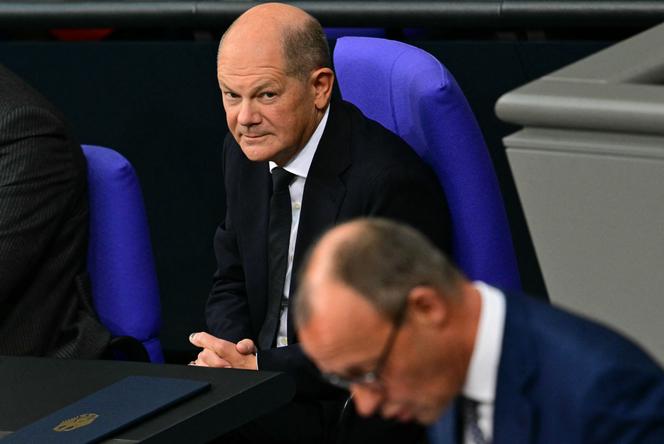


The fate of Ukraine will be decided on February 23, 2025. Since the start of the campaign for the early parliamentary elections in Germany scheduled for that day, the war taking place on Europe's borders has provided the favorite playground for the two main contenders for the chancellorship: the outgoing chancellor, Olaf Scholz, and his rival, the conservative Friedrich Merz of the CDU, widely ahead in the polls. The conflict, around which the regional elections in the east of the country were already partly played out in September, is emerging as one of the main themes of this election, against the backdrop of Donald Trump's victory and the threat of American disengagement.
Scholz, elected chancellor a few weeks before Russia invaded Ukraine in 2022, is claiming to be the chancellor of peace and his doctrine has been one of cautious support for Kyiv, designed to protect Germany from an escalation that his rival would threaten to provoke. Merz, on the other hand, has taken a more bellicose, realistic line, calling on Germany to deliver Taurus medium-range missiles to Kyiv, which would enable it to strike deep into Russian territory, and has condemned the Chancellor's hesitations.
The last few weeks have provided a telling spectacle of how both candidates intend to use the Ukrainian conflict to campaign, in a country itself divided over the role Germany should play in it. According to a recent survey by ARD public television, 61% of those questioned opposed Germany delivering Taurus cruise missiles to Ukraine. But polls have also showed that support for more military aid is tending to increase, especially since Trump's victory.
Lagging behind in opinion polls and contested by some of his own party's members, who would have preferred Defense Minister Boris Pistorius, Scholz has been pulling out all the stops lately, alternating between diplomacy and a show of force. After taking some of Germany's allies by surprise by calling Russian president Vladimir Putin on November 15, he made a surprise visit to Kyiv on Monday, where he promised a further 650 million euros in aid. This was only his second trip to Ukraine since the start of the war. He visited in February 2022, just before Russia invaded, and again in June of the same year, accompanied by Emmanuel Macron and then Italian prime minister Mario Draghi.
Between two photos with wounded soldiers in hospitals and a presentation of the latest models of drones, some built with German help, Scholz spent more than two and a half hours talking with the Ukrainian president, Volodymyr Zelensky, who had been irritated by his phone call to the Russian president. "Ukraine can count on Germany. We say what we do. And we do what we say," Scholz said at the end of his trip, recalling the scale of Berlin's support – 7 billion euros in 2024, more than twice as much as Paris – but still refraining from delivering the longer-range weapons demanded by Kyiv.
You have 44.76% of this article left to read. The rest is for subscribers only.
